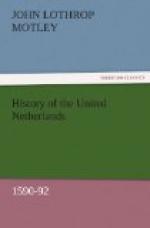His son de Teligny; who in his turn had just been exchanged and released from the prison where he had lain since his capture before Antwerp, had hastened with joy to join his father in the camp, but came to close his eyes. The veteran caused the chapter in Job on the resurrection of the body to be read to him on his death-bed, and died expressing his firm faith in a hereafter. Thus passed away, at the age of sixty, on the 4th August, 1591, one of the most heroic spirits of France. Prudence, courage, experience, military knowledge both theoretic and practical, made him one of the first captains of the age, and he was not more distinguished for his valour than for the purity of his life, and the moderation, temperance, and justice of his character. The Prince of Dombes, in despair at his death, raised the siege of Lamballe.
There was yet another chronicler, fighting among the Spaniards, now in Brittany, now in Normandy, and now in Flanders, and doing his work as thoroughly with his sword as afterwards with his pen, Don Carlos Coloma, captain of cavalry, afterwards financier, envoy, and historian. For it was thus that those writers prepared themselves for their work. They were all actors in the great epic, the episodes of which they have preserved. They lived and fought, and wrought and suffered and wrote. Rude in tongue; aflame with passion, twisted all awry by prejudice, violent in love and hate, they have left us narratives which are at least full of colour and thrilling with life.
Thus Netherlanders, Englishmen, and Frenchmen were again mingling their blood and exhausting their energies on a hundred petty battle-fields of Brittany and Normandy; but perhaps to few of those hard fighters was it given to discern the great work which they were slowly and painfully achieving.
In Paris the League still maintained its ascendancy. Henry, having again withdrawn from his attempts to reduce the capital, had left the sixteen tyrants who governed it more leisure to occupy themselves with internal politics. A network of intrigue was spread through the whole atmosphere of the place. The Sixteen, sustained by the power of Spain and Rome, and fearing nothing so much as the return of peace, by which their system of plunder would come to an end, proceeded with their persecution of all heretics, real or supposed, who were rich enough to offer a reasonable chance of spoil. The soul of all these intrigues was the new legate, Sego, bishop of Piacenza.




